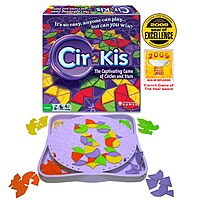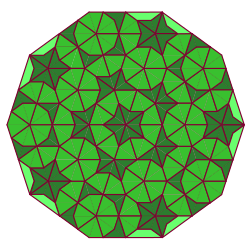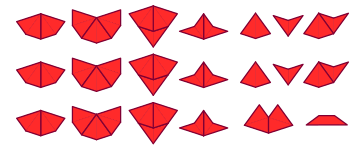
Ludo is a strategy board game for two to four players, in which the players race their four tokens from start to finish according to the rolls of a single die. Like other cross and circle games, Ludo is derived from the Indian game Pachisi. The game and its variations are popular in many countries and under various names.

Mahjong or mah-jongg is a tile-based game that was developed in the 19th century in China and has spread throughout the world since the early 20th century. It is played by four players. The game and its regional variants are widely played throughout East and Southeast Asia and have also become popular in Western countries. The game has also been adapted into a widespread online entertainment. Similar to the Western card game rummy, mahjong is a game of skill, strategy, and luck. To distinguish it from mahjong solitaire, it is sometimes referred to as mahjong rummy.

Reversi is a strategy board game for two players, played on an 8×8 uncheckered board. It was invented in 1883. Othello, a variant with a fixed initial setup of the board, was patented in 1971.
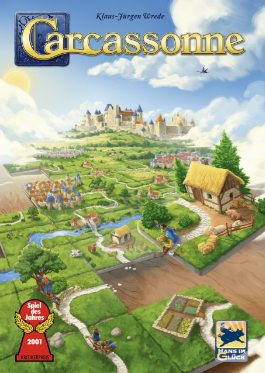
Carcassonne is a tile-based German-style board game for two to five players, designed by Klaus-Jürgen Wrede and published in 2000 by Hans im Glück in German and by Rio Grande Games and Z-Man Games (currently) in English. It received the Spiel des Jahres and the Deutscher Spiele Preis awards in 2001.

Parqués is the Colombian version of a board game in the cross and circle family. The game is described as a "random thinking" game: the moves depend on the roll of the dice but players must consider possible strategies before executing their move. The objective of the game is to advance all the pieces to the end. Once in the safety zone player can use 2 dice until they are one space away from home, where they will then just use one die.

Parcheesi is a brand-name American adaptation of the Indian cross and circle board game Pachisi, published by Parker Brothers and Winning Moves Games USA.

Carrom is a tabletop game of Indian origin in which players flick discs, attempting to knock them to the corners of the board. The game is very popular in the Indian subcontinent, and is known by various names in different languages. In South Asia, many clubs and cafés hold regular tournaments. Carrom is very commonly played by families, including children, and at social functions. Different standards and rules exist in different areas. It became very popular in the United Kingdom and the Commonwealth during the early 20th century.

Janggi, sometimes called Korean chess, is a strategy board game popular on the Korean Peninsula. The game was derived from xiangqi, and is very similar to it, including the starting position of some of the pieces, and the 9×10 gameboard, but without the xiangqi "river" dividing the board horizontally in the middle.
In tabletop games and video games, game mechanics are the rules or ludemes that govern and guide the player's actions, as well as the game's response to them. A rule is an instruction on how to play, a ludeme is an element of play like the L-shaped move of the knight in chess. A game's mechanics thus effectively specify how the game will work for the people who play it.
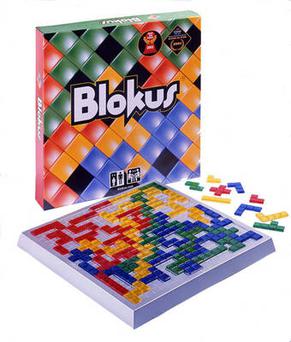
Blokus is an abstract strategy board game for two to four players, where players try to score points by occupying most of the board with pieces of their colour. The board is a square regular grid and the pieces are polyominoes. It was designed by French mathematician Bernard Tavitian and first released in 2000 by Sekkoïa, a French company. It has won several awards, including the Mensa Select award and the 2004 Teacher's Choice Award. In 2009, the game was sold to Mattel.
Medina is a board game designed by Stefan Dorra and published by Hans im Glück and Rio Grande Games in 2001. In the game, three or four players compete to be the most influential developer of Medina, a desert city near the Atlas Mountains in 1822. Variations of the game allow 2 or 5 players. The game was nominated for the 2001 Deutscher Spiele Preis and the 2003 Jeu de l'année, but won neither prize.
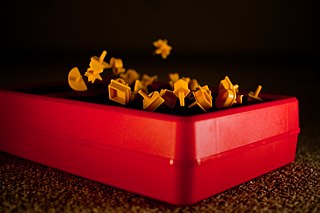
Perfection, originally produced by the Pennsylvania company Reed Toys, is a game by the Milton Bradley company. The object is to put all the pieces into matching holes on the board before the time limit runs out. When time runs out, the board springs up, causing many, if not all, of the pieces to fly out. In the most common version, there are 25 pieces to be placed into a 5×5 grid within 60 seconds.
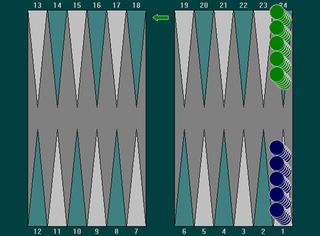
Tapa (Тапа) is a tables game played in Bulgaria and North Macedonia. It is also played in Greece, where it is known as Plakoto. The word tapa means bottle cap.

Puzzle Pirates is a massively multiplayer online game developed by Three Rings Design. The player takes the role of a pirate, adventuring on the high seas and pillaging money from roaming enemy ships. The mechanics of Puzzle Pirates are driven by puzzles. For example, to effectively sail a ship, players must play puzzle games representing work at the sails for speed, pumping bilge water to remove it from the ship, and carpentry to fix any damage the ship may take.

Traditional Filipino games or indigenous games in the Philippines are games that have been played across multiple generations, usually using native materials or instruments. In the Philippines, due to limited resources for toys, children usually invent games without needing anything but players.There are different kinds of Philippine Traditional Games that are suited for kids, and the games also stand as one of the different culture and/or traditional games of the Philippines. These games are not only fun to play, but these games are also good for you. This is because different games require different skills. These games are also an important part in Filipino culture.

Headache is a board game for in which the object is to land a playing piece on top of all opponents' pieces. Play moves in circles until one player has captured every other players' cones on the board and declared the winner. All players are welcome to occupy any space throughout the game, provided the die rolls allow, and there are eight spaces that serve as "safe" spots, where a cone resting on this space cannot be captured. Captured pieces are not sent back to start, but are permanently lost.
Pasang is a two-player abstract strategy board game from Brunei. The game is often referred to as Pasang Emas which is actually a software implementation of the traditional board game. The object of this game is to acquire the most points by capturing black and white tokens on the board. Black tokens are worth 1 point, and white tokens are worth 2 points. The board is initially laid out with all 120 black and white tokens in one of over 30 traditional patterns. Players choose a piece called a "ka" which is used to capture the tokens on the board. Each player's "ka" moves around the board capturing as many tokens as possible. As a note, the "kas" are the only mobile pieces in the game. The other pieces are stationary, and are captured by the "kas". Players must capture token(s) during their turn, or lose the game. When all tokens have been captured from the board, the player with the most points is the winner. However, if there are any tokens left on the board, and none can be captured on a player's turn, then that player loses the game, and the other player is the winner.

Qwirkle is a tile-based game for two to four players, designed by Susan McKinley Ross and published by MindWare. Qwirkle shares some characteristics with the games Rummikub and Scrabble. It is distributed in Canada by game and puzzle company Outset Media. Qwirkle is considered by MindWare to be its most awarded game of all time. In 2011, Qwirkle won the Spiel des Jahres, widely considered the most prestigious award in the board and card game industry. A sequel, Qwirkle Cubes, was released by Mindware in 2009.

FITS is a Tetris-like board game published by Ravensburger in 2009.

Tobit is a draughts game that resembles Turkish and Armenian draughts in that pieces move orthogonally. It especially resembles Turkish draughts in that pieces only move orthogonally.
